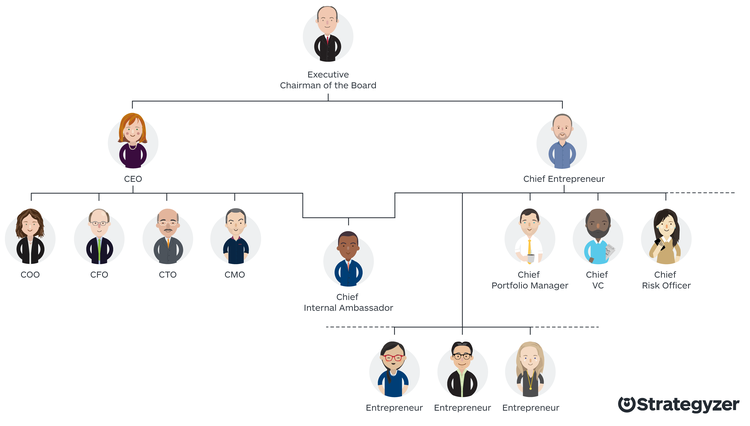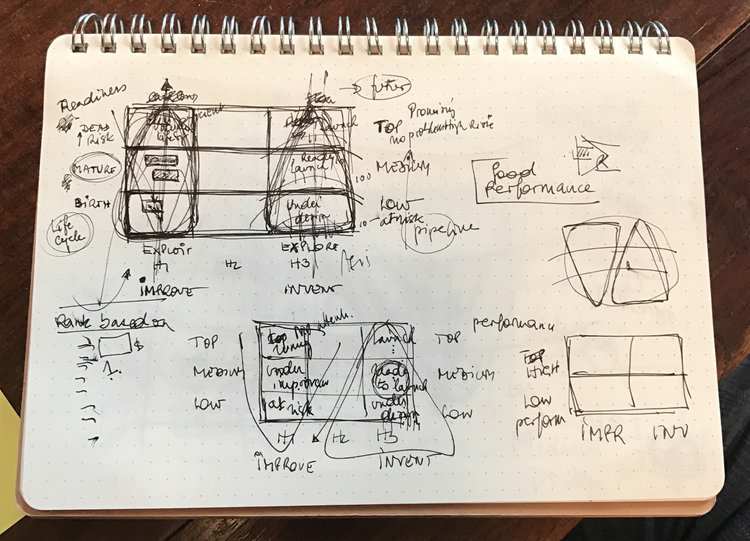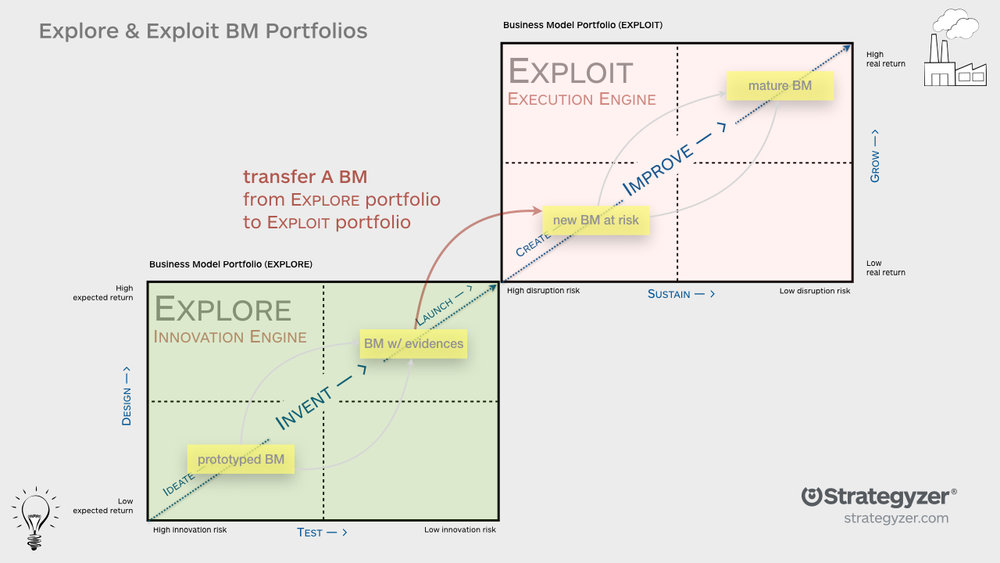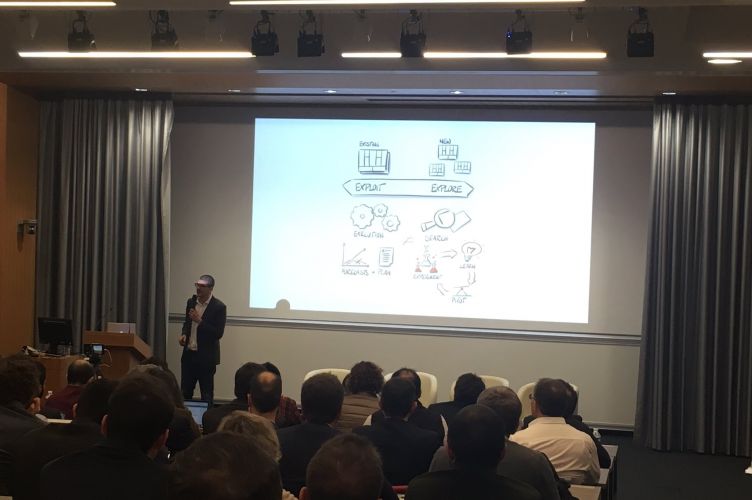“Established companies and their leadership face a triple challenge in the 21st century. How can they fend off disruption, please public markets and activist investors with cost-cutting programs and better margins, and, simultaneously, reinvent their organization for future growth”? Such was the topic of the event, which was organized by ESCP’s Jean-Baptiste Say Institute in collaboration with Lean Startup Experience and with the support of Lean Startup Summit Europe. “We are extremely lucky because a month ago we had the opportunity to have Yves Pigneur and it was a very different, complementary story, commented Jean-Baptiste Say Institute Scientific Director Yves Bureau”.
In his lecture (podcast can be found here) inspired by research with Yves Pigneur published in the January issue of Indian Management Magazine and outlined in a blog post, Alexander Osterwalder explained how senior leaders can best position their organizations for this triple challenge. He began by saying most CEOs are afraid of being disrupted, and cited a recent study according to which only 6% of corporate executives are satisfied with their firm’s innovation performance. “I think today the leading companies (…) are not shaped by the environment, they create it, he said. They shape business models and entire industries, sometimes they create them. I think that’s possible, it’s not rocket science but it takes a big step into really wanting to break through”. According to him, it requires thinking differently, beyond industries. “Ask yourself: what industry is Apple in? Harware? Software? Content? What do you think? Retail? The business model now is the unit of analysis, not the industry, so designing great business models is the art”.
How to overcome the challenges of innovation in the 21st century
For Alex Osterwalder, even though it is hard it’s more important than ever for companies to focus on inventing the future: “Anybody who tells you innovation is easy is lying, or trying to sell you something”. He outlined how to design a corporate structure and culture that are fit to manage a portfolio of existing business models, new innovation projects, and future growth engines. What he calls the ambidextruous organization, “an organization that can play the full spectrum, get better and better at execution but at the same time create growth engines. It’s really hard and there are very few companies that have this kind of dual operating system, under one roof. But if you can put that in place, I believe you can build an invicible company”.
Alex Osterwalder explained that companies have to develop truly ambidextrous organizational structures where the innovation arm is given equal power alongside the existing business. According to him, companies that pursue real growth innovation need to give the activity real leadership with real power, which requires a whole new organizational chart of people and skills led at the top by a Chief Entrepreneur.

He made his point thanks to humour and sometimes provocation, but also practical exercices about specific cases like Nestlé’s Nespresso or Amazon’s marketplace. He cited Jeff Bezos – “I believe we are the best place in the world to fail” - and Amazon as an example of a truly ambidextrous organization, since it went from e-commerce business to consumers, to a completely new business model for B2B. “The backstage is actually the same, so from an industry classification perspective it’s different but from a business model perspective, there are huge synergies”. To him, Amazon’s success is based on its acceptance of failure. “The people and the teams behind these failures, they don’t get fired because it’s part of the company culture, they go on and work on the next project, they get promoted sometimes”.
Designing an innovation culture by mapping it
Alex Osterwalder also explained that good business model innovation starts with your culture, and that companies can intentionally design an innovation culture that unearths and builds new growth engines, reduces the risk of experimentation, and increases ROI on R&D. But that to make it happen, you have to recognize that your innovation culture requires very different skills, processes, metrics and incentives than your execution culture. “We want to add a great understanding and great processes to innovate in the value proposition and business model, and that often requires a re-wiring of the management system, in particular when we talk about new business models. Few companies have gone so far, where they truly have an ambidextruous organization with a dual culture”. He introduced the Culture Map, which he developed with Yves Pigneur and XPLANE founder Dave Gray - who he said considers that “if you want to understand a culture, you need to map it” -, to help companies capture, discuss, and manage company culture. “Uber went through this crazy process where they had a terrible, terrible culture, and they’re now in the process of re-desiging it, he told a packed house. You can be proactive, and I think innovation is a great topic to start working on culture”.

Osterwalder also explained that companies need a new and integrated approach to managing a dynamic portfolio of established and emerging businesses. “Companies need to better manage their portfolio of mature businesses and new opportunities - some that maintain and protect the current business, while cultivating the business models of tomorrow”. He showed a new concept prototyped with Yves Pigneur and called the Business Portfolio Map, that “helps organizations measure and assess if the existing portfolio is healthy; if the business is prone to disruption; and ultimately, to help companies make better investment decisions”.

To relive this conference, check out its podcast here!
About Alexander Osterwalder
Alex Osterwalder and his former PhD supervisor at the University of Lausanne, Yves Pigneur, co-authored Value Proposition Design: How to Create Products and Services Customers Want, and Business Model Generation: A Handbook for Visionaries, Gamechangers and Challengers.
Osterwalder and Pigneur are ranked #7 in the 2017 Thinkers50, the Oscars of management thinking, and won a Thinkers50 Strategy Award in 2015.
Alex Osterwalder was also a journalist for swiss business magazine BILANZ, and co-founded several startups including consultancy firm strategyzer.com, which aims at “putting practical tools into the hands of every business strategy practitioner”.
Campuses
